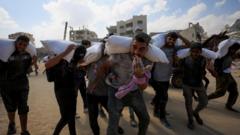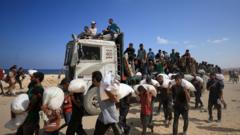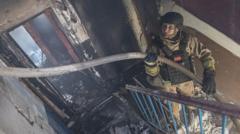**This decision comes as the humanitarian crisis deepens in the region, with criticism directed towards Israel's military actions and their impact on civilians.**
**Israel's Humanitarian Landscape: Visa Denial for UN Official Highlights Crisis**

**Israel's Humanitarian Landscape: Visa Denial for UN Official Highlights Crisis**
**Israel's refusal to renew the visa of a senior UN humanitarian official exacerbates ongoing tension amid escalating violence in Gaza.**
Israel has denied the renewal of a visa for Jonathan Whittall, a senior United Nations official overseeing humanitarian efforts in Gaza, heightening a fraught relationship between the Israeli government and the international body. Gideon Saar, Israel’s foreign minister, announced the decision via social media, claiming that Whittall’s actions and statements reflected a “biased and hostile conduct against Israel.” This marks a continuation of tensions that surfaced when Whittall's predecessor also had his visa revoked under similar circumstances.
The UN Office for the Coordination of Humanitarian Affairs (OCHA), where Whittall serves as acting head, expressed strong discontent over Israel's move, emphasizing the vital need to report on conditions in Gaza, especially as the UN seeks to facilitate essential aid. OCHA asserted, “Attempts to silence us are not new, but threats of reduced access to the civilians we’re trying to serve are intensifying.”
Recent reports indicate that Israeli military actions continue to result in significant casualties, with dozens of Palestinians killed or injured near a border crossing, even as aid trucks enter the beleaguered territory. The humanitarian situation has deteriorated dramatically as the ongoing conflict, ignited by a Hamas-led attack on October 7, 2023, and an intense military response from Israel, has claimed over 57,000 lives in Gaza to date. Tragically, the vast majority of the casualties have included civilians and children.
The United Nations and the World Food Program have raised alarms over a looming hunger crisis that has left many Gazans facing severe food shortages, with nearly one in three reportedly going days without eating. Whittall, a vocal critic of Israeli policies regarding humanitarian aid, labelled the situation as “weaponized hunger” and spoke out against the violence that has cropped up near aid distribution points.
The ongoing war and the resultant humanitarian crisis are not only pressing challenges for the affected populations but also for global observers, NGOs, and authorities striving to manage aid under increasingly hostile conditions.
The UN Office for the Coordination of Humanitarian Affairs (OCHA), where Whittall serves as acting head, expressed strong discontent over Israel's move, emphasizing the vital need to report on conditions in Gaza, especially as the UN seeks to facilitate essential aid. OCHA asserted, “Attempts to silence us are not new, but threats of reduced access to the civilians we’re trying to serve are intensifying.”
Recent reports indicate that Israeli military actions continue to result in significant casualties, with dozens of Palestinians killed or injured near a border crossing, even as aid trucks enter the beleaguered territory. The humanitarian situation has deteriorated dramatically as the ongoing conflict, ignited by a Hamas-led attack on October 7, 2023, and an intense military response from Israel, has claimed over 57,000 lives in Gaza to date. Tragically, the vast majority of the casualties have included civilians and children.
The United Nations and the World Food Program have raised alarms over a looming hunger crisis that has left many Gazans facing severe food shortages, with nearly one in three reportedly going days without eating. Whittall, a vocal critic of Israeli policies regarding humanitarian aid, labelled the situation as “weaponized hunger” and spoke out against the violence that has cropped up near aid distribution points.
The ongoing war and the resultant humanitarian crisis are not only pressing challenges for the affected populations but also for global observers, NGOs, and authorities striving to manage aid under increasingly hostile conditions.





















